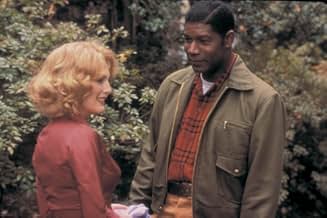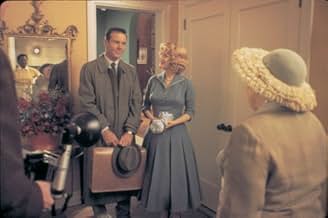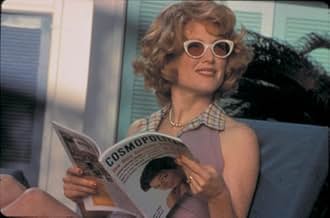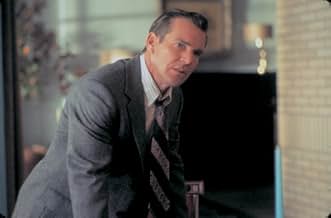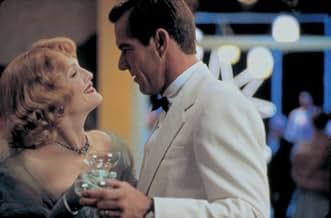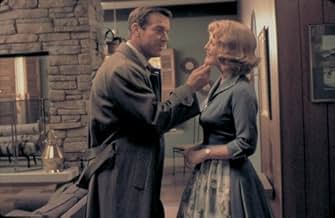In 1950s Connecticut, a flustered housewife faces a marital crisis and mounting racial tensions in the outside world.In 1950s Connecticut, a flustered housewife faces a marital crisis and mounting racial tensions in the outside world.In 1950s Connecticut, a flustered housewife faces a marital crisis and mounting racial tensions in the outside world.
- Nominated for 4 Oscars
- 102 wins & 96 nominations total
- Sarah Deagan
- (as Jordan Puryear)
- Billy Hutchinson
- (as Kyle Smyth)
- Director
- Writer
- All cast & crew
- Production, box office & more at IMDbPro
Featured reviews
Cathy can't catch the clue when she bails Frank out of the police station and he mutters angrily about the arresting officers mistaking him for a "loiterer." A loiterer in a neat business suit with a topcoat in Hartford? Only one kind of well-dressed character like that attracted police attention in those days.
Dispensing good cheer everywhere, Cathy decides to bring dinner to her hardworking-at-night husband (no spoiler here, every media review has this part). And what should she find? Frank is in the arms of a man, kissing him actually, clothing in disarray.
Today, a presumably straight spouse or lover being gay, secretly, isn't a taboo subject. It was in Cathy and Frank's time and, in fact, no movie from that period would have touched this subject with a ten-foot boom mike. "An Affair to Remember" was risque enough.
Cathy insists Frank get help and James Rebhorn in a brief role as psychiatrist Dr. Bowman explains the most modern therapeutic approaches to "converting" Frank to exclusive heterosexuality. This was in the days when homosexuality was an official diagnosed mental illness.
In what could have been a familiar variation of the white/black awkward beginnings of friendship seen in Sidney Poitier movies but which in this instance has a refreshing originality, Cathy befriends gardener Raymond Deagan (Dennis Haysbert). An attractive and prominent white woman being seen in public with a black man in the South at this time would have led to probably horrific repercussions. Here we get to see 1950s racist northern suburbia, people who decry Arkansas obduracy (there's a brief shot of President Eisenhower on TV announcing the despatch of the 101st Airborne Division to confront the state's mad governor at Little Rock High School) while dispensing their own venom. No guns, no lynchings, no white sheets - just an insidious degradation of blacks, reducing them to actual invisibility when convenient.
The friendship between Cathy and Raymond is at first tentative and it grows with affecting tenderness. So does the shocked anger of the wealthy gaggle in Frank and Cathy's social circle.
Is Frank cured of his "illness?" Does racial tolerance and respect for diversity seep into Hartford's tony neighborhood? Does everyone live happily ever after? Go see the film. The mid-afternoon packed audience in Manhattan's Lincoln Plaza Cinema broke into applause at the end.
Viola Davies turns in a small but critically important role as the Whitaker's maid, Sybil. Fine acting.
Director Todd Haynes allowed Moore and Quaid to make their roles real, involving, and anguished and funny in turn. Both stars deserve Oscar and Golden Globe nominations.
Rooted in the 50s in many ways, composer Elmer Bernstein turned out a good score, original rather than depending on recognizable tunes from the time. But as is so often the case, at points the score is unduly intrusive where the actors' words and expressions convey all that is necessary, music being an annoyance.
8/10.
The Whitakers are the model of a perfect '50's family. Frank is a handsome, highly successful businessman with a beautiful, well-respected wife, who divides her time between raising their two children, maintaining their lovely suburban home, and spearheading the requisite number of charities for a woman in her position. In fact, she is such an archetype of the ideal housewife that a local society paper has chosen to feature her as one of their profiles. Cathy's perfect life, however, is quickly shattered when she makes the shocking discovery that the husband she loves so dearly is a closeted homosexual, who obviously married her as a means of hiding the truth from both the world and himself. In true '50's fashion, Frank, when Cathy catches him in the act with another man, decides to seek `treatment' from a therapist, in the vain hope that he will be `cured' of his `problem.' These scenes are a jolting and stark reminder of just how far we've come from the days when this unenlightened viewpoint held sway in society. The film also deals with the issue of racism, when Cathy becomes a confidante and friend of a young black man who works as her gardener. When this relationship is noticed by the townspeople, the ugly realities of bigotry and prejudice come to the fore, proving that, even in a place like Connecticut, where no actual laws segregated blacks from whites, the attitudes of the common citizenry were no more enlightened than those that permeated the Deep South.
In a stroke of genius, Haynes has patterned his film after actual 1950's melodramas, particularly those by director Douglas Sirk, whose movies like `Imitation of Life' and `Magnificent Obsession' provided daring (for the times) studies of social issues like racism and May/December romances within the context of what were, essentially, glossy, visually palatable soap operas. Sirk's films are often honored for their ability to inject subtly subversive sentiments into popular, mainstream entertainments. `Far From Heaven' looks exactly like those films, from the color-splashed autumnal setting to the picture-perfect interiors of an upper-middle class home in suburban New England where familial and personal problems appear as out of place as `Leave it to Beaver' would seem if it were on network TV today. The astounding achievement here is that Haynes is both paying homage to and utterly destroying the period at the same time. He succeeds in immersing the audience for nearly two hours in this amazingly recreated world. We come to feel as trapped in the stifling setting as the characters themselves do. Haynes captures with emotional force the sense of helplessness these characters feel at not being able to `measure up' to the demands of their world and the utter sadness and loneliness caused by the fact that they don't even have anyone they can truly open up to and discuss their problems with, for they become instant candidates for rumor-mongering and societal rejection the moment they do. `Keeping up appearances' becomes the sole consideration in such circumstances, leading many people to lead lives of quiet desperation, hidden behind blandly conformist, upbeat exteriors. In our day and age, when people have gone to the other extreme - pouring out their every twisted idiosyncrasy on daytime TV talk shows for the benefit of a sensation-craving audience - it's important to be reminded of how much worse the alternative can be. If nothing else, `Far From Heaven' is a study of the kind of emotional and psychological damage that can be inflicted on an individual when a society encourages repression and conformity at all costs.
As Cathy, Julianne Moore gives a performance that can be called nothing less than overwhelming. She is utterly heartbreaking as a good-natured woman, totally baffled by the curves life is throwing at her, trying to maintain a façade of normalcy and happiness even though inside her psyche has been inexplicably and irrevocably torn to pieces. She wants desperately to figure out where her husband is coming from, but the distance he keeps putting between himself and her precludes any such understanding. Yet Cathy is also a paradoxical figure in that, even though she is struggling to keep her life and marriage appearing `normal' to the outside world, she is subtly undercutting that goal by challenging the status quo in her relationship with Raymond, the gardener. Her genuine revulsion at the racist attitudes she sees around her compels her to act in a way true to her own convictions. Moore does a perfect job conveying every facet of this richly detailed and complex character. It is certainly award-worthy work from one of our very finest actresses. As Frank, Dennis Quaid, in a controlled, restrained and heart-wrenching performance, captures the sadness of a man who wants desperately to live the life he's chosen but who just can no longer fight against the truth of his own nature. In a way, Cathy and Frank's situations are mirror images of one another. Both discover a `love' on the outside of societal norms, yet, because of the personal pain that that love is inflicting on the other partner in the marriage (his for another man and hers for another man, as well), the two hurting people seem unable to perceive that connection they share. These two fine performers turn what might have been just a cold exercise in style into a deeply moving and profoundly meaningful work
Technically, the film is a masterpiece on every level, from its art direction to its costume design to its cinematography. The veteran composer Elmer Bernstein has provided a richly evocative symphonic score, modeled on actual '50's style soundtracks, that brings out the melodramatic richness of the film's many set pieces. Yet, his work here also has a quieter quality, particularly in the subtle piano riff, which reminds us quite a bit of his classic score for `To Kill a Mockingbird.' As a director, Haynes shows himself in total control of his medium, blending all these elements into a complete and satisfying whole.
`Far From Heaven' is really unlike any movie you have ever seen, a fascinating admixture of the old and the modern. It also happens to be one of the very best films of 2002, a true work of art.
Did you know
- TriviaCinematographer Edward Lachman created the 1950s "look" by using the same type of lighting equipment (incandescent), the same lighting techniques, and the same type of lens filters when shooting this film, as would have been used on a 1950s era melodrama.
- GoofsThe typewriter around the corner from Frank Whitaker's office is a late-model Selectric (circa 1971 at the earliest).
- Quotes
Cathy Whitaker: That was the day I stopped believing in the wild ardor of things. Perhaps in love, as well. That kind of love. The love in books and films. The love that tells us to abandon our lives and plans, all for one brief touch of Venus. So often we fail at that kind of love. The world just seems too fragile a place for it. And of every other kind, life remains full. Perhaps it's just we who are too fragile.
- Crazy creditsThe first end credit reads "for Bompi"
- ConnectionsFeatured in Anatomy of a Scene: Far from Heaven (2002)
- How long is Far from Heaven?Powered by Alexa
Details
- Release date
- Countries of origin
- Official sites
- Language
- Also known as
- Lejos del cielo
- Filming locations
- Production companies
- See more company credits at IMDbPro
Box office
- Budget
- $13,500,000 (estimated)
- Gross US & Canada
- $15,901,849
- Opening weekend US & Canada
- $211,279
- Nov 10, 2002
- Gross worldwide
- $29,027,914
- Runtime1 hour 47 minutes
- Color
- Sound mix
- Aspect ratio
- 1.85 : 1
Contribute to this page



